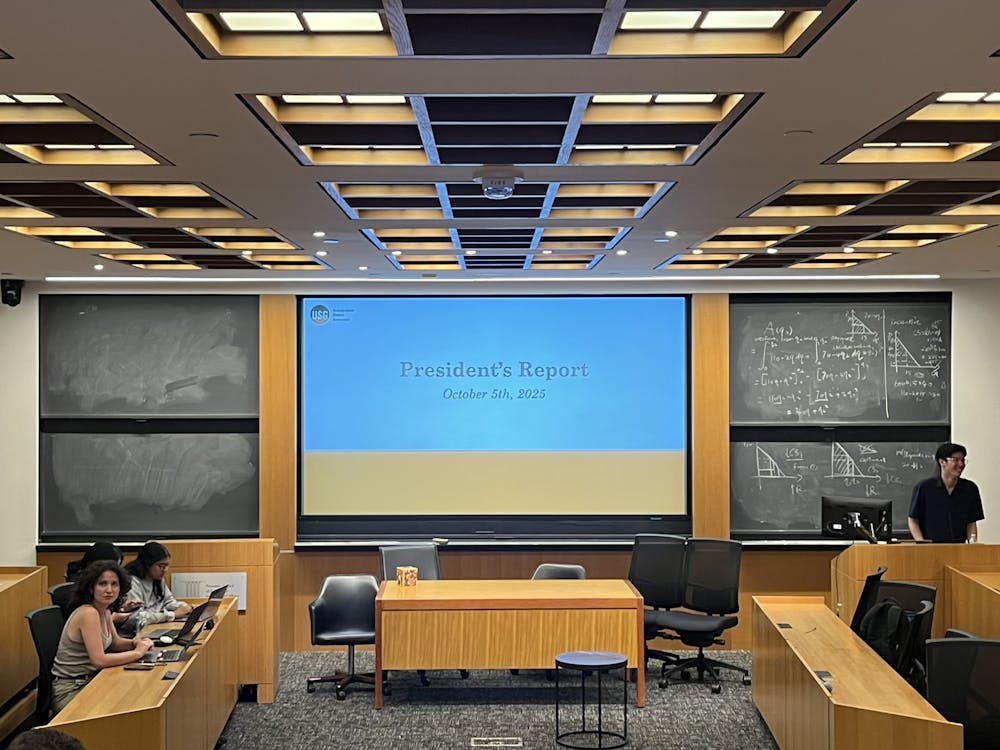Controversy over changes to University meal plan options took center stage at the Undergraduate Student Government (USG) meeting on Sunday as administrators from the Office of University Services fielded questions from USG Vice President Aishwarya Swamidurai ’26 and audience members.
The discussion followed Monday’s announcement that the University would require students living on-campus to purchase a meal plan, effectively eliminating the independent meal option. The change comes with a new Block 32 plan for students in dining co-ops or eating clubs to replace the currently University-sponsored two dining hall meals per week.
The policy shift immediately prompted backlash from the Interclub Council, co-op leaders, and financial aid recipients, who expressed their disappointment. USG leadership said they were not notified of any details before the changes were made public and were later distributed a survey to collect student feedback.
Drawing on roughly 200 survey responses with “around 17 percent” of respondents on the independent plan, Swamidurai pressed administrations on the reason behind the decision.
“All independent students reported that being independent has either increased their sense of belonging or has had no impact at all,” said Swamidurai. “How did the administration decide that ending independent status should be the main solution for fixing isolation?”
Many of the other questions prepared by USG focused on edge cases with respect to the dining decision, such as transfer students with partners and students with allergies or religious dietary restrictions.
Vice President for University Services Chad Klaus prefaced his answers to audience questions by stressing that the University representatives “did not come prepared with responses,” considering they were not provided with questions in advance.
Every respondent of the student survey on the independent dining plan reported that the independent option had either positive or neutral effects on their sense of belonging at Princeton. Additionally, the Huron report on dining did not indicate a causal relationship between the independent dining option and negative social impacts — a stated motivation for these changes.

“We do, in fact, know that over many long longitudinal studies, that those students who have had independent status have had less positive outcomes from their experience at Princeton,” said Klaus. However, he acknowledged that there was room for uncertainty regarding the data’s accuracy.
“It’s true that I’m not certain that from a statistical perspective that we suggest that causation is from independent status and isolation,” he said.
Assistant Vice President of Finance and Administration Maureen McWhirter defended the new plan as part of longstanding discussions between the University and the student body. “One other thing about student engagement: I know you said [the change] was sudden. It’s actually not,” she said.
“You all haven’t necessarily been here through all of these conversations, but we have been engaging with students,” she added. Klaus also noted that the changes were developed in coordination with the Office of the Dean of the College and the Office of the Vice President for Campus Life.

The University will host information sessions about the new plan on Tuesday at 1 p.m. in McCosh 64 and Wednesday at 6:30 p.m. in the Frist Multipurpose Room C.
According to Klaus, University Services is also exploring options to “see what might be technically feasible in the new room draw process to potentially mimic what we had prior for Spelman.” This process would be exclusive to Spelman and exclude other upperclass dorms which have large numbers of communal kitchens, but no in-suite kitchen layouts.
Administrators added that the University has “invested quite substantially in co-ops” over the past several years, and is evaluating dining hall seating expansions in the Rocky-Mathey and Yeh-New College West complexes to address lunchtime congestion.
Financial details for the new plan were also shared. “Going forward, [full aid packages] would be packaged at the cost of the midpoint of the eating clubs plus the cost of the Block 32 plan,” said Klaus. For students not on financial aid, the administrators released preliminary cost estimates for the plans. In a statement later confirmed by the University, Deputy Vice President for University Services Debby Foster said that the intermediate Block 160 dining plan will cost approximately $4,500.
In the case of a student with Block 160 and on full financial aid, their refund “is going to be in the neighborhood of $6,500 to $7,000,” said Foster. However, she raised concerns that some students will use the money to support their families, rather than for meals.
“We know students have an impossible situation because they are torn between their family who needs money and they need to nourish themselves,” she said. “It is written in the rules that [the refund money] is intended to nourish the student.”
Regarding other USG matters, USG President Enzo Kho ’26 briefly recapped meetings with administrators on mental health and international students. He laid out an upcoming dinner between USG and PSafe, as well as a post-fall break USG senate workshop with 2019 USG President Rachel Yee.
Budget measures, including a commitment to fully fund speaker fees and a $1,500 reduction in expenditures for an upcoming student venture gala, passed unanimously.
Klaus concluded the discussion by reaffirming the University’s stance. “We aren’t discussing whether there is going to be a [different] policy,” he said. “The policy has been considered for an extended period of time, and so the policy is what the policy is.”
However, he noted that the University plans to continue to receive student input. “How we think about implementing it, I think, can still be informed,” he said.
Gray Collins is a News contributor for the ‘Prince.’ He is from Villanova, Penn. and can be reached at gc7410@princeton.edu.
Please send any corrections to corrections[at]dailyprincetonian.com.








